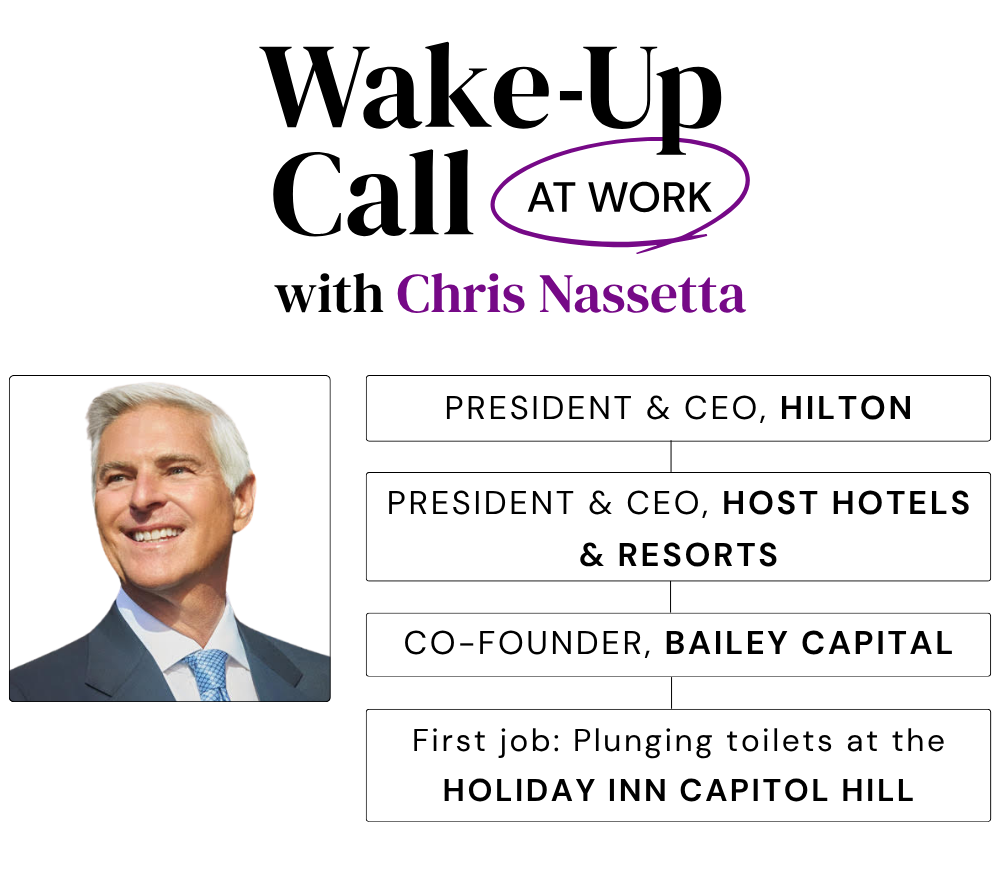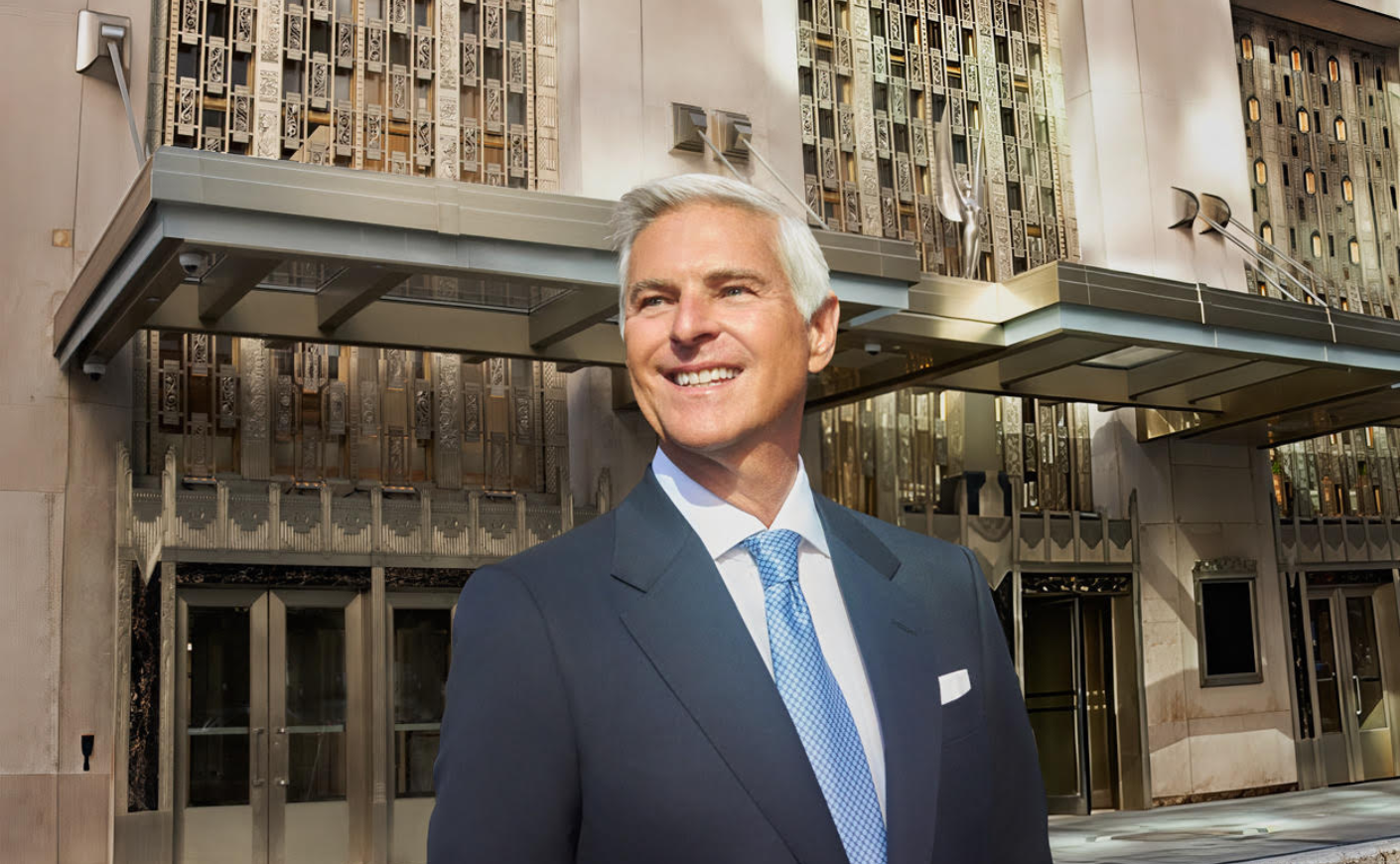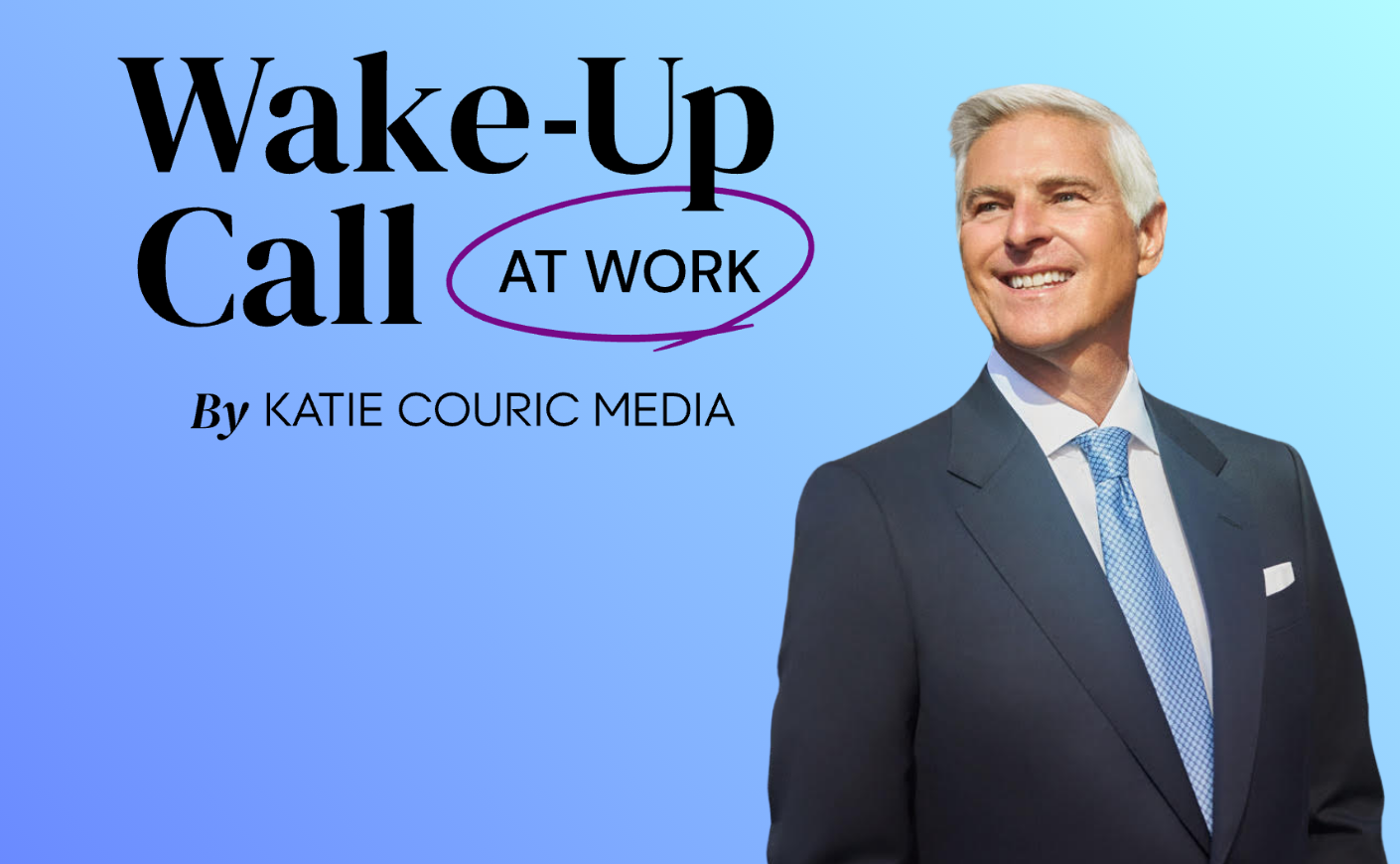Chris Nassetta likes to joke that his career began in the toilet. The CEO of Hilton got his start in hospitality, cleaning up after guests and solving light plumbing disasters at a Holiday Inn in Washington D.C. Needless to say, he’s come a long way since then.
Nassetta has led Hilton for the past 18 years, steering the company through its blockbuster IPO in 2013 and a global pandemic that rocked the hotel industry — all while more than doubling its number of properties worldwide.
For our LinkedIn newsletter, Wake-Up Call at Work, we spoke to the CEO about the early lessons that shaped his views on leadership, the one productivity hack he’ll never give up, how travel is changing, and a whole lot more.

What’s one thing you always look for in a potential hire?
Humility. My mother taught me early on to not think too highly of yourself because there’s always something more you can do, whether that’s in service of others or to better yourself. From an early age, I was pushed to work hard to achieve my goals, and to keep reaching higher. And I've found that the best leaders and team members are the ones who approach their work with that same mindset.
Humble people are better listeners. They're more open to learning and adapting. They give credit to others and take responsibility when things go wrong. In our business, where we're serving hundreds of millions of guests a year across 140 countries, you can't afford to have people who think they have all the answers.
Like many CEOs, you’re an early riser, getting up every day at 5 a.m. Do you have any other habits you think make you so productive?
Well, the first thing I do in the morning is read the Wall Street Journal. My business school professors at UVA drilled that habit into me, and I’ve been religious about it ever since.
I'm also meticulous about email: I read and respond to every one I receive. People might think that's impossible, given the volume, but it's critical for me. Everyone who’s emailed me has taken the time to send me a thoughtful message, and they deserve a response from me and my team.
Who’s a current leader you admire?
I've been fortunate to work alongside incredible leaders. Jon Gray, who chairs our board, has helped build an amazing culture at Blackstone and consistently demonstrates the kind of thoughtful, people-first leadership I deeply respect. More broadly, I admire CEOs who aren't afraid to listen and adapt, and who understand that culture needs to be core to strategy. The leaders doing the best work are the ones who recognize their success is built on the strength of their teams.
The pandemic devastated travel. What were the hardest decisions you had to make during that time, and what did you learn from it?
We had to make a lot of tough decisions in order to protect our people, protect the business, and prepare for recovery. When we open a hotel, we make a commitment to that community to be there for the long haul. So to suspend operations, even temporarily, at nearly all of our hotels around the world was extremely difficult for our team members, and it had a major impact on our business.
At the same time, I was so proud of our teams for showing up for the communities we serve in so many different ways, from providing free room nights to first responders in partnership with American Express, to organizing food drives, and continuing to share our signature hospitality with everyone who walks through our doors. That time really reinforced two things: First, that our hospitality is a force for good in the world. And second, that keeping a steady hand on the wheel — making a plan and executing it — builds confidence in your teams and helps you prepare for a brighter tomorrow.
What’s one emerging trend in hotel design or guest amenities that you think will impact the industry over the next five years?
The biggest shift isn't just about design or amenities. It's about understanding why people are traveling in the first place. We call it the "why-cation" — where travel begins not with a destination, but with a motivation.
Our research shows travelers want very different things from their stays. Some are seeking silence and solitude to recharge. Others value efficiency and unique experiences with other travelers. At Hilton, we're designing our properties and experiences around these different motivations, because understanding someone's “why” means we can provide the personalized service guests are looking for and deliver the reliable, friendly stays they expect.
How many Hilton properties have you stayed at, and which is your favorite?
I've stayed at thousands of our properties over the years, and asking me to pick a favorite is like asking me to pick a favorite child. All of them are special, and they all serve different purposes for different guests.
That said, the one I'm most excited about right now is the Waldorf Astoria New York. We've completed stunning renovations of what Conrad Hilton proudly called "The Greatest of Them All.” The original Waldorf has been restored to its former grandeur, and it’s really setting the standard for a new era of luxury travel. It was a labor of love to bring to life with our partners, and we’re so proud of it.

When you walk into one of your hotels unannounced, what’s the first thing you look for?
The moment you walk into a lobby, you can feel whether a hotel is being run well. First impressions are everything, and that begins at the entrance and lobby. I'm looking for the basics done exceptionally well. That's what separates good hospitality from great hospitality.
And next, I’m looking for guests to speak with. I'll walk up to people in the elevator or the lobby and just ask, "How's your stay going?" You learn so much from those conversations. They'll tell you about a team member who went above and beyond, or they'll mention something we need to fix. That real-time feedback is invaluable.
I also make it a point to talk with our team members. I want to know how they're doing, if they have what they need, if they feel supported. You can't deliver great guest experiences without great team-member experiences first.
What’s the most unexpected feedback you’ve ever heard from a guest that you actually agreed with?
The best feedback we get is from guests about how they actually use the room, which can be very different from how we envisioned it when we designed it. Our guests are living in these rooms, and they know better than anyone what works and what doesn't.
Based on our guests’ feedback, we’ve gotten very disciplined about intentionally designing small things that make a big difference — things like being able to turn on the shower without getting a face full of cold water, nightlights that help you find your way around an unfamiliar room, charging ports right next to the bed, or tables and seating that are movable to account for the different ways you might use a desk, like working or having a meal.
As a fellow Yorktown High and UVA grad (wahoowa!), how would you say those early years shaped you and your perspective on work?
What really shaped me was the community I grew up in in Northern Virginia. I'm from a big Italian family, and my parents instilled important values in me that I carry to this day. My dad had this magnetic, hospitable personality — people gravitated to him wherever he went. He taught me that relationships are everything. And my mom taught me the importance of both humility and hard work. She encouraged me to wake up every day feeling like an underdog, and to never get too comfortable. I drive my team crazy with that obsession: I’m always asking about what’s next, and thinking about how we can further improve.













